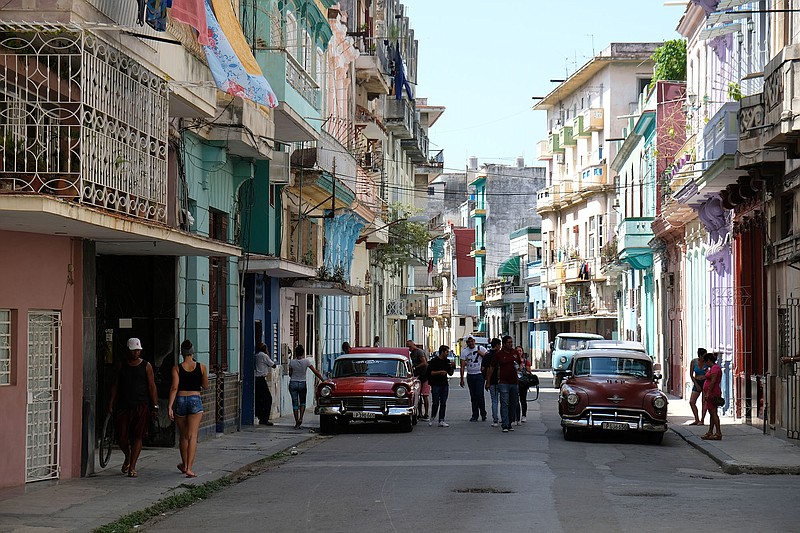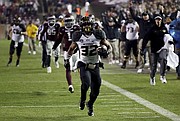HAVANA-Everything and nothing has changed in Cuba from when President Barack Obama made it easier for Americans to travel there and President Donald Trump made it harder.
After Obama reopened the U.S. Embassy in 2015, a lot of American tourists flooded to Cuba but were one-and-done, seeing the island as the long-forbidden curiosity and not a recurring vacation. Then, last month, Trump nullified significant permissions that had allowed U.S. citizens to experience a nation minutes south of Florida.
Americans still come, but their clogging of Havana streets and restaurants has subsided.
The collective reaction, according to dozens of Cubans, appears to have been a shrug. They are resilient, inventive and practiced at pushing through disappointment.
An auto-repair businessman said the end of the Obama era and its American tourism money is "difficult at first but better in the end" because its flow of cash had enabled the Cuban government and needed to stop.
But many yearn not for political upheaval but opportunity, including the kind that the American invasion had promised. "I don't want to change the whole revolution," said a taxi driver. "Just a few things."
From Obama to Trump, Cuba appears different in many aspects and the same in an essential way.
With Obama's easing of restrictions gradually taking root, options for traveling from the U.S. to Cuba were still limited in 2015, and I got a costly charter out of Tampa, Fla., with a lot of paperwork. For my visit last month, a couple of days after Trump tightened travel restrictions, the 59-minute JetBlue hop with express beverage service from Orlando, Fla., to Jose Marti International Airport was paid for with points.
Four years ago at Jose Marti airport, I was cornered by unsmiling and relentless Cuban security personnel and closely questioned.
This time, Jose Marti's previous tension was gone. There was little sign of police. That was because of the surge of Americans that Cubans got used to, many people told me.
In 2015, changing dollars for Cuban Convertible Pesos, or CUCs, anywhere but at a government currency exchange felt treacherous.
This time, seemingly, everybody gladly calculated the dollars-to-CUCs math: in hotels, taxis, restaurants and hole-in-the-wall art galleries tucked into Havana's crumbling streets.
The influx of Americans created a boom in restaurants and rooms-for-rent operated out of private homes. Once illegal in Cuba, they are now flourishing.
There are dozens of high-end "paladares" in Havana, where you can get a delicious meal for two for about $60, the same as a doctor's monthly government pay. And you can get fresh, organic produce, once unheard of in a country that imports most of its food.
Some "casa particular" accommodations-rooms for rent-are like boutique hotels, tranquil and alluring with local art. Those places might charge 40 CUCs a night.
Others cost 15 CUCs and are often noisy-Havana's nightly symphony of babies, televisions, dogs, car horns, conversations and slammed doors riffles easily through porous buildings-and not so plush.
Four years ago, Cubans spoke cautiously of their government's repressions, mixing metaphors, questions and third-person declarations so that it was impossible to say if they were guilty of being critical. Maybe with the passing of Fidel Castro-he died in 2016 at age 90 and the ubiquitous billboards with his portrait and slogans have since been taken down-there is more openness.
Cubans, particularly artists in storefront cubbyholes that seem to be everywhere, now readily share their views with American strangers.
"A lot of other countries are doing business in Cuba," said one. "Why isn't the United States? You could be the boss of Cuba."
But the new exuberance in street talk clings to an old understanding of confidentiality.
"CDR" signs hang from building facades everywhere, signaling a representative of the Committees for the Defense of the Revolution lives there. These block captains are known as something between a busybody and a government spy.
Their job must be more challenging now. Cell service has arrived in a big way since 2015. So, too, have internet connections at plazas and parks, where people sit with their phones and laptops for long stays. Internet-access cards cost a few CUCs for a few hours. Bandwidth is decent.
A lingering image from four years ago was the Malecon sea wall at the city's edge, facing Miami. As twilight dissolved to darkness, a community sat and chatted, enjoying breezes off the Straits of Florida.
A lingering image last month at the Malecon was the soft glow of faces-illuminated by phone screens.
In 2015, as Obama eased restrictions for Americans traveling to Cuba, there was a palpable excitement for"el cambio," the change.
But the anticipated big change didn't really happen, which leads to the part about Cuba that remains the same: a grinding frustration over the lack of opportunity in a country where literacy and college-completion rates outpace the U.S. but jobs are scarce and poorly paid.
Four years ago, a lot of people spoke of their distress from the U.S. embargo on trade. More recently, the embargo was rarely mentioned. Their focus is internal, on what Cubans need to do.
With the influx of high-spending Americans came economic winners and losers. Then came a crackdown on entrepreneurs from a government worried that capitalism would undermine revolutionary ideals of equality-and centralized control.
Said the owner of a casa particular: "They are afraid people will become economically independent, and that is a threat to their power." Eyeing my tiny notebook, he said, as others insisted: "Don't use my name."
That Havana entrepreneur, saying the government will never change for the better on its own accord, suggested only the collapse of the Venezuelan government and the end of its oil for Cuba will bring the civil unrest that will trigger what Obama failed to provoke: el cambio.
There were other entrepreneurs who nodded their respect to Trump for a "mano dura," or hard hand.
But they were a small minority. Obama is still widely embraced and "Trump crazy" is often one of the first things Cubans say within seconds of realizing they are meeting an American.
As many U.S. citizens found in the four years between the presidents, the U.S. and Cuba are familiar neighbors and worlds apart.
"Enjoy my country but just don't try to understand it." That advice came at a junk-yard art gallery, while the artist held court like the godfather and Santeria-infused music and dance swirled outside.
Cuba is difficult to understand. Havana combines colonial architecture in a dizzying flux of disintegration and reconstruction, Russian, Chinese and Venezuela influences, infusions of global tourism and continued constrictions of a communist government.
Thanks to the embargo, Havana mirrors the 1950s, with American cars flamboyantly plying island roads. Their skins declare classic Detroit but conceal a puzzle of transplanted engines, transmissions and brakes that are new, antique, international and handmade.
By outward appearance, much of the city comes across as a dangerous ghetto. Wrong. It's a police state where guns are outlawed. Streets are safe. And while the exteriors of many buildings are in a shocking state of exotically gorgeous deterioration, inside they are scrupulously clean and tidy.
"That is the Cuban way," a businessman said, chuckling, of the nation's devotion to domestic cleanliness. "I don't know why."
But there is a recurring theme. For decades, the government has provided free housing, health care and subsidized staples. Job placement for everything from tradesmen to professors to professionals is centrally controlled, and a high monthly salary is about $60 a month.
That has left Cubans healthy, informed and hungry for meaningful pursuits. They typically enjoy talking to Americans-often because they have a mother in Houston, or have visited Miami, or have some other visceral bond with the U.S.
During the Obama administration, Americans thronged to Cuba under the Treasury Department's "people-to-people" permission aimed at cultural engagement. Trump eliminated that option and shut down popular travel via cruise ships.
Permissions that remain include visits for family, government business, journalism, professional, religious, educational and humanitarian matters.
Another is "support of the Cuban people," or engaging "in a full-time schedule of activities that enhance contact with the Cuban people."
It feels often like there is a kinship of one or two degrees of separation between Floridians and Cubans, via the lawyers, stylists, pharmacists, teachers, police and others who are our friends and neighbors in Florida and came from Cuba.
But on the island of Cuba, Cubans are blessed and burdened in ways that would be unimaginable to most Americans.


